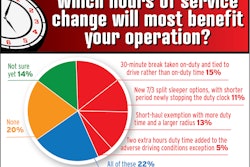A federal rule to overhaul hours of service limits on truck drivers’ schedules will soon be published in the Federal Register, the U.S. DOT’s Federal Motor Carrier Safety Administration announced Thursday. Of note, the rule expands split-sleeper berth options afforded to drivers to allow them to split their 10-hour off-duty period into windows of seven hours and three hours, in addition to the existing eight-hour, two-hour option. Unlike current regs, the shorter window in any split of off-duty time will not count against drivers’ 14-hour on-duty clock.
The coming reforms also overhaul provisions around the 30-minute break requirement, allowing drivers to use the break in an on-duty, not-driving status and requiring it within their first eight hours of drive time, rather than their first eight hours on-duty.
FMCSA says the rule should be published in the Federal Register in the coming week, and the changes will become effective 120 days after its publication. So if the rule is published next week, drivers could begin operating under the new HOS regs in late September. These are the first changes to hours regs implemented by FMCSA since 2013, though several provisions within that rule (such as the limits to the use of a 34-hour restart) were ultimately reversed by Congress.
The coming overhaul will not change the daily 14-hour on-duty limit or the 11-hour drive-time limit. However, the rule will expand the adverse driving conditions provision by allowing drivers to extend both their drive-time limit and their on-duty window by two hours if they encounter adverse conditions such as weather or traffic congestion. The agency says the provision will allow drivers to either sit and wait out the conditions or to drive slowly through them.
Unlike the hours proposal FMCSA issued last August, the final hours reforms do not include the option for drivers to pause their 14-hour clock for up to three hours while off-duty to extend the 14-hour clock. FMCSA Acting Administrator Jim Mullen said the agency deemed the seven-hour, three-hour split “sufficiently flexible” to that end, given with the new change the shorter period in any sleeper split will in fact stop the rolling duty clock, unlike the current split-sleeper rules.
 What’s your quick take on these hours of service revisions? Will they prove useful in your operation? Mobile users, tap the call button here to weigh in with a message with your story on our podcast voicemail line. Be sure to state your name and base location with any message. If you’re reading on a desktop, call 530-408-6423 to weigh in. Be sure to state your name and location with any message.
What’s your quick take on these hours of service revisions? Will they prove useful in your operation? Mobile users, tap the call button here to weigh in with a message with your story on our podcast voicemail line. Be sure to state your name and base location with any message. If you’re reading on a desktop, call 530-408-6423 to weigh in. Be sure to state your name and location with any message.Also, he said, concerns expressed in the public comment period last fall gave the agency pause in proceeding with the three-hour provision alone as proposed.
Lastly, the changes expand the exemptions for short-haul drivers by extending the allowed on-duty period for short-haul drivers from 12 hours to 14 hours, and extending the short-haul radius from 100 air miles to 150 air miles. Drivers under the short-haul exemption aren’t required to keep records of duty status.
Mullen announced the changes in a media call Thursday morning and was joined by U.S. Transportation Secretary Elaine Chao.











